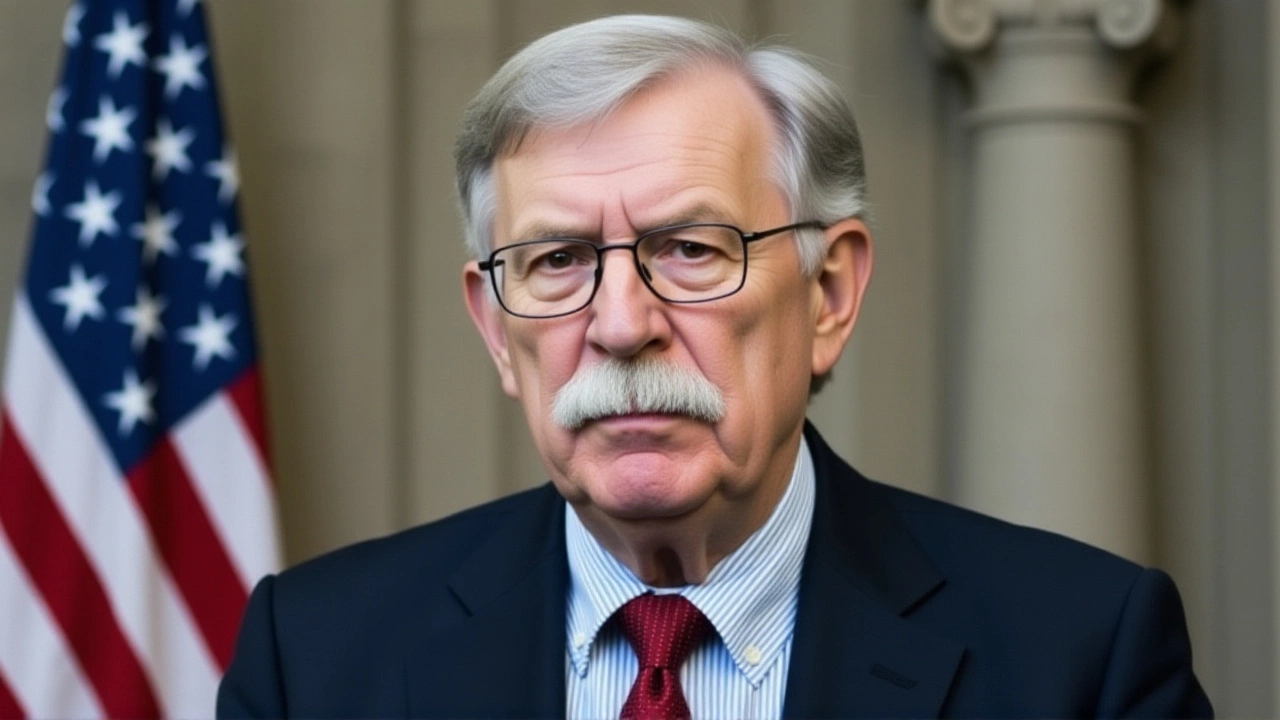
When John Robert Bolton, former National Security Advisor under Donald J. Trump, was charged Thursday, October 17, 2024, in federal court in Brooklyn, New York, the case instantly became the headline of every political talk show. The Department of Justice announced an eight‑count charge of transmitting national defense information (NDI) and ten counts of unlawfully retaining NDI – a total of eighteen felonies that could send the 75‑year‑old former adviser to prison for decades.
Background and Bolton’s Tenure
Bolton joined the Trump administration in April 2018, stepping in after the resignation of Nadia Schadlow. His stint lasted only 17 months, but the period was marked by aggressive foreign‑policy moves – from the North Korea summit to the decision to pull U.S. troops from Syria. Those high‑stakes meetings generated mountains of Top Secret and Special Access Program (SAP) material, all stored in the White House’s secure facilities.
According to a 2023 memoir Bolton released, he routinely took handwritten notes during classified briefings. The notes, he claimed, were for personal reference – a practice not unusual among senior officials, though the official protocol requires the notes to stay within the secure environment.
Details of the Indictment
The grand jury indictment, filed by the Department of Justice, alleges that shortly after leaving office in September 2019, Bolton "converted" those handwritten notes into Microsoft Word documents. He then emailed the files to two relatives who had no security clearance. One of the relatives, whose identity remains undisclosed, set up an encrypted group chat – described in the filing as a “secure messaging application with end‑to‑end encryption” – and used it to forward the documents to additional, also unauthorized, recipients.
Among the seized files were "details of a future attack by an adversarial group in another country" slated for September 2018, and "plans for a foreign missile launch" documented in January 2019. Both were classified at the Top Secret level with SAP controls, meaning they were among the most tightly guarded intelligence assets in the U.S. government.
U.S. Attorney Breon S. Peace, who leads the Eastern District of New York, said in a press release: “These charges underscore the seriousness with which the Justice Department treats the mishandling of our nation’s most sensitive information.”
Investigation Triggered by a Cyber Intrusion
The chain of events that led to the indictment began in 2021, when a cyber intrusion hit Bolton’s personal email account. Federal investigators traced the breach to a group believed to be linked to Iran – a detail confirmed by CBS News’s legal analysis team.
“The intrusion gave us a window into the unauthorized retention and transmission of classified material,” a CBS News source said. “What we found was a systematic effort to share highly sensitive intelligence with people who had no clearance.” The investigation, which involved the FBI and the National Security Agency, uncovered a two‑year span of illicit communications, ending just before the 2021 hack was discovered.

Legal Implications and Potential Penalties
Under 18 U.S.C. § 793, prosecutors must prove that Bolton knowingly transmitted or retained national defense information with reason to believe it could aid a foreign nation or harm the United States. If convicted on all eighteen counts, Bolton faces up to 10 years per count, potentially stacking to more than a century in prison, though sentencing guidelines often result in a lower aggregate term.
Legal experts note the case is distinct from the more publicized “leak” prosecutions involving former officials who published classified material. Bolton’s alleged wrongdoing centers on private, unauthorized transmission – a nuance that could affect both the trial strategy and potential plea deals.
Reactions and Political Context
The indictment has ignited a firestorm on both sides of the aisle. Republican lawmakers, many of whom have defended Bolton in the past, denounced the move as “politically motivated.” Senate Majority Leader Mitch McConnell released a statement calling the charges “a partisan witch hunt aimed at silencing dissenting voices in our foreign‑policy establishment.”
Democrats, meanwhile, praised the Justice Department’s resolve. Representative Janet Yellen, who chairs the House Oversight Committee, said, “No one is above the law, not even former national security officials. This case sends a clear message that mishandling classified information will be met with swift accountability.”
Public opinion appears split. A recent Quinnipiac poll found that 48% of respondents view the indictment as justified, while 42% see it as an overreach. The division mirrors broader debates over how former officials should be treated when they exit the corridors of power.

What Comes Next?
Bolton’s arraignment is scheduled for early November 2024 at the Eastern District courthouse. He is expected to plead not guilty, and his defense team has already hinted at a motion to dismiss, arguing that the evidence does not prove “knowing” intent.
Regardless of the outcome, the case will likely set a precedent for how future officials manage classified material after they leave office. With the rise of encrypted messaging apps and remote work, the Justice Department has signaled it will intensify scrutiny of post‑service data handling.
Key Takeaways
- John Bolton faces 18 federal felony counts related to the mishandling of Top Secret documents.
- The indictment stems from a 2021 cyber intrusion linked to Iran that exposed unauthorized email transmissions.
- Charges were filed by the Eastern District of New York, with U.S. Attorney Breon S. Peace leading the prosecution.
- Potential penalties include decades in prison, though sentencing will depend on plea negotiations and trial outcomes.
- The case highlights growing concerns over secure handling of classified information after officials leave government.
Frequently Asked Questions
How does this indictment affect other former national‑security officials?
The case sets a legal benchmark that former officials cannot assume immunity once they leave office. Prosecutors say any unauthorized retention or transmission of classified material, regardless of rank, could trigger similar charges, prompting agencies to tighten post‑employment data‑security protocols.
What evidence linked the cyber intrusion to Iran?
Cyber‑forensics identified IP addresses and malware signatures consistent with known Iranian state‑sponsored hacking groups. The intrusion prompted a joint FBI‑NSA investigation that uncovered the encrypted group chat and the flow of classified files to unauthorized recipients.
Could Bolton claim executive privilege as a defense?
Executive privilege typically protects communications made while in office, not after an official’s term ends. Since the indictment alleges post‑employment actions, legal scholars say the privilege would not shield Bolton from prosecution.
What penalties could Bolton face if convicted on all counts?
Each count carries a maximum of ten years in prison, meaning the theoretical ceiling exceeds a century. In practice, sentencing guidelines usually aggregate the terms, so Bolton could be looking at several decades behind bars, plus hefty fines.
How might this case influence future handling of classified information?
Agencies are expected to revise post‑service clearance policies, possibly requiring former officials to surrender all notes and digital copies. The Justice Department has already signaled an intent to pursue similar cases where encryption tools are used to bypass security clearances.